-
Tips for becoming a good boxer - November 6, 2020
-
7 expert tips for making your hens night a memorable one - November 6, 2020
-
5 reasons to host your Christmas party on a cruise boat - November 6, 2020
-
What to do when you’re charged with a crime - November 6, 2020
-
Should you get one or multiple dogs? Here’s all you need to know - November 3, 2020
-
A Guide: How to Build Your Very Own Magic Mirror - February 14, 2019
-
Our Top Inspirational Baseball Stars - November 24, 2018
-
Five Tech Tools That Will Help You Turn Your Blog into a Business - November 24, 2018
-
How to Indulge on Vacation without Expanding Your Waist - November 9, 2018
-
5 Strategies for Businesses to Appeal to Today’s Increasingly Mobile-Crazed Customers - November 9, 2018
Family use controversial treatment to stunt severely disabled daughter’s growth
Her parents Jenn and Mark feared that should Charley grow into an adult her mobility would be massively compromised and she would be forced to spend most of her life in bed.
Advertisement
Ms Hooper and her husband Mark Hooper are faced with the day to day challenges of caring for their little girl who was born with Cerebal Palsy. The New Zealand couple gave their daughter hormones to stop her growth. Charley is now around 1.3m and 24kg, and will remain so for the rest of her life.
A Waikato family has used hormones to deliberately stunt the growth of their disabled daughter and keep her child-sized forever.
But parents like the Hoopers insist it helps their children retain their quality of life.
“Growing would have stopped her doing things”.
‘We didn’t take away any choices that weren’t already taken from her’. Charley’s parents believe that keeping her small ensures that she will be able to preserve a bit of her dignity and will prevent her from a future of body harnesses.
Doctors are now receiving more requests for growth attenuation.
They stumbled upon the controversial treatment of giving her hormones to stunt her growth.
But many doctors refuse to prescribe the treatment, which has also given rise to public unease.
Charley Hooper can not speak, walk, or control her limbs and is nearly blind after being left severely brain damaged due to being deprived of enough oxygen at birth and being diagnosed with epilepsy.
“People are really entitled to grow and to become the people they were meant to be”, says Margaret Nygren, chief executive of the American Association on Intellectual and Developmental Disabilities. And if the answer is no, then why would one want to do that to someone else?’
However, Charley has never been able to give her consent leaving the Hoopers only to guess at what their daughter would want.
“I think that most families in terms of their children’s interests would want to know they’ve made the right decision”.
Charley is a jumble of uncontrolled limbs with a floppy head. Her parents try to interpret what she feels by the pitch and volume of her moans, and whether her freckled face is relaxed or contorted in a gaping yawn.
Initially blocked by the local ethics board, they eventually got permission but only by travelling overseas to South Korea to start the hormone treatment.
They were then able to continue the treatment at home. Hofman says that may be because oestrogen changes neurological activity and can relax muscles.
The Hoopers said it would be impossible for Charley to join them on family trips to the mall, and vacations to Bali like she does today, without hormone treatment.
If she was bigger, they would not be able to soothe her by cuddling her in their laps, and carrying her in their arms. None of that would be possible, they say, if she was bigger.
Charley can not see or recognise anyone, including her parents.
‘Charley’s womb was too large for her age and if she started to menstruate, she could bleed out so we decided that she would go ahead with the operation [hysterectomy],’ said Ms Hooper.
“These decisions are serious and we would all want the oversight or the benefit of judicial authority in these decisions. Who wants this life forever?”
Advertisement
She said she had “absolutely no regrets” about undertaking the treatment, as her daughter was better than she had ever been.





























